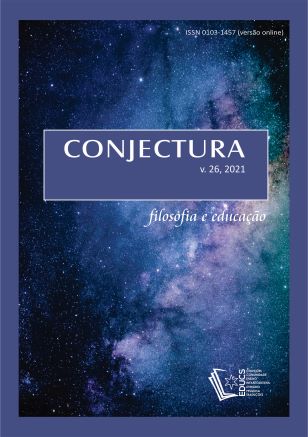C. S. Lewis and a critic for education promoting the abolition of man
DOI:
https://doi.org/10.18226/21784612.v26.e021022Abstract
This article aimed to highlight the reasons for a criticism by the Irish writer Clive Staples Lewis (1898-1963) towards the direction of youth education in Europe, notably in the United Kingdom, in the 20th century. His criticism gained as his main thesis what the writer called “the abolition of man”, resulting from an educational system that promotes an alleged rationality that prevented the development of an intermediate element in the human being between the cerebral and the visceral. For Lewis, that intermediate element is the emotions that, well trained, endow the intellect with capacities to deal with the mere animal organism. For this purpose, our starting point in this work was outlined by the cut of a broader work, which consists of an exhibition that, in general, highlights some guidelines that point to the composition of a Philosophy of Education in C. S. Lewis. We seek to collect, initially, the elements of a philosophical anthropology, collected directly, by an interpretative procedure, from the vast work of the author in question, particularly The Abolition of Man, Pure and Simple Christianity, The Weight of Glory, Christian Reflections, The Four Loves, Letters from a Devil to His Apprentice, God in the Dock, Ethics to Live Better, Christian Reflections, among others. In addition to these texts used as a direct source, we also take the work of Gabrielle Greggersen, entitled The Philosophical Anthropology of C. S. Lewis, where the author makes an interpretive incursion into the author’s fictional literature texts, as well as the works biographies of Alister MacGrath, Conversing with Lewis and The Life of C. S. Lewis, in which the Irish philosopher’s life and work are richly detailed.
Keywords: C. S. Lewis. Philosophy. Education. Philosophy of education. Philosophical anthropology
References
SANTO AGOSTINHO, Bispo de Hipona. O livre-arbítrio. São Paulo:
Paulus, 1995 (Coleção patrística).
DAVIS, B. Extreme Makeover: reforma total: desenvolvimento moral e o encontro com Aslam. In: BASSHAM, Gregory; WALL, Jerry L. (ed.). As crônicas de Nárnia e a filosofia: o leão, a feiticeira e a visão do mundo. Trad. de Marco Malvezzi. São Paulo: Madras, 2006. p. 111- 122.
GREGGERSEN, G. A antropologia filosófica de C. S. Lewis. São Paulo: Editora Mackenzie, 2001.
LEWIS, C. S. Surpreendido pela alegria. São Paulo: Mundo Cristão, 1998.
LEWIS, C. S. A abolição do homem. Trad. de Gabriele Greggersen. Rio de Janeiro: Thomas Nelson Brasil, 2017a. (Edição no formato Kindle).
LEWIS, C. S. Cristianismo puro e simples. Rio de Janeiro: Thomas Nelson Brasil, 2017b. (Edição no formato Kindle).
MATHIS, D. Introdução: meio século após C. S. Lewis. In: PIPPER, J.; MATHIS, D. (org.). O racionalista romântico. Brasília, DF: Editora Monergismo, 2017. (Edição no formato Kindle).
McGRATH, A. A vida de C. S. Lewis: do ateísmo às terras de Nárnia. São Paulo: Mundo Cristão, 2013. (Edição no formato Kindle).
McGRATH, A. Conversando com C. S. Lewis. São Paulo: Planeta, 2014.
PIPPER, John S. Lewis, racionalista romântico: como os caminhos até Cristo moldaram sua vida e o seu ministério. In: PIPPER, John S. Lewis; MATHIS, David (org.). O racionalista romântico. Brasília, DF: Editora Monergismo, 2017. (Edição no formato Kindle).
Downloads
Published
How to Cite
Issue
Section
License
1. The publication of the originals will imply the assignment of copyright to Conjectura Journal.
2. Texts cannot be reproduced without authorization from the Journal after acceptance.









